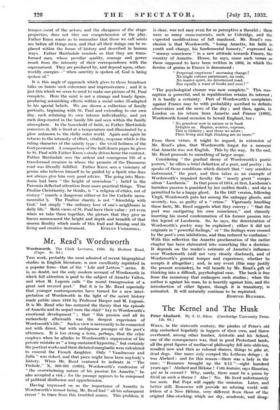Mr. Read's Wordsworth
Wordsworth. The Clark Lectures, 1930. By Herbert Read.
(Cape. 4s. 13d.)
Tins work, probably the most admired of recent biographical studies in English literature, is now excellently reprinted in a popular form—that of the "Life and Letters" series. It is, no doubt, not the only modern account of Wordsworth in which full attention is paid to the subject of Annette Vallon, and what M. Legouis calls "the moral transgression of a great and revered poet." But it is to Mr. Read especially that younger contemporaries have turned for a new inter- pretation of Wordsworth in the light of the secret history made public since 1916 by Professor Harper and M. Legouis. It is Mr. Read who has matured the theory that the episode of Annette and its sequel were the chief" key to Wordsworth's emotional development " ; that "this passion and all its melancholy aftermath was the deepest experience of Wordsworth's life." Such a view is necessarily to be connected not with direct, but with ambiguous passages of the poet's utterance. It is too strong a term, perhaps, that the critic employs when he alludes to Wordsworth's suppression of his private mistake as " a long-sustained hypocrisy," but certainly the poetical works and their dictated marginalia were calculated to conceal the French daughter. Only " Vaudracour and Julia" was risked, and that piece might have been anybody's history. When Mr. Read ventured to indicate in "The Prelude," X, 369-381 (1805), Wordsworth's confession of "the overwhelming nature of his passion for Annette," he also accepted a risk ; for the passage appears to be composed of political disillusion and apprehension.
• Having impressed on us the importance of Annette in Wordsworth's inmost being, Mr. Read had " all his subsequent career" to trace from this troubled source. This problem, it
is clear, was not easy even for so perceptive a theorist ; then were so many cross-currents, such as Coleridge, and the expected modifications of full manhood. - Mr. Read's con- clusion is that Wordsworth, "losing Annette, his faith in
youth and change, his fundamental honesty," expressed his "Uneasy conscience" in a new attitude towards France, the country of Annette. Hence, he says, came such verses as those supposed to have been written in 1802, in which the famine of genius in France is denounced :
"Perpetual emptiness ! unceasing change ! No single volume paramount, no code, No master spirit, no determined road, But equally a want of books and men ! "
"The psychological closure was now complete." This con- ception is powerful, and in republication retains its interest ; it is hardly a certainty. Part of Wordsworth's complaints against France may be with probability ascribed to definite observation and the news of the day ; and then, again, in London on his return from Annette and France (1802), Wordsworth found occasion to bewail England, too :
"No grandeur now in nature or in book Delights us. Rapine, avarice, expense, This is idolatry ; and these we adore ; Plain living and high thinking are no more."
From those verses, it might be argued, in extension of Mr. Read's plan, that Wordsworth forgot for a moment that Annette was not English. This by the way. In the end,
Mr. Read proceeds to something of larger scope.
Considering "the gradual decay of Wordsworth's poetic powers," he offers a brief definition of a poet, and poetry ; he speaks of those conditions which disturb that "very sensitive instrument," the poet, and then takes as an example of Wordsworth's impaired faculty the "nearly great" compo- sition" Laodamia." In that poem of 1814, at first, Laodamia's harmless passion is punished by her sudden death ; and she is permitted to be a happy ghost. In the 1827 version, following Virgil, Wordsworth puts her among the unhappy ghosts, and severely, too, as guilty of a "crime." Vigorously handling these facts, Mr. Read suggests what they. convey : "that the poet was castigating his own conscience," and clumsily inserting his moral condemnation of his former passion into this legend of Laodamia. So, he says, the deterioration of Wordsworth's poetry may be explained ; either it did not originate in "powerful feelings," or "the feelings were crossed
by the poet's own inhibitions, and thus reduced to confusion:, With this reflection the Annette proclamation of the earlier chapter has been elaborated into something like a doctrine. It depends on the reader's estimate of Atmette's influence
over Wordsworth (still not very clearly disclosed), and of Wordsworth's general temper and experience, whether he accepts it altogether ; and, in any event (this may justify the present reminder), he will benefit by Mr. Read's gift of thinking into a difficult, psychological case. The book is free from the monotony that endangers such studies ; when the author is against his man, he is heartily against him, and the introduction of other figures, though it is transitory, is animated. It will naturally continue to be reprinted.
EDMUND BLUNDEN.














































 Previous page
Previous page